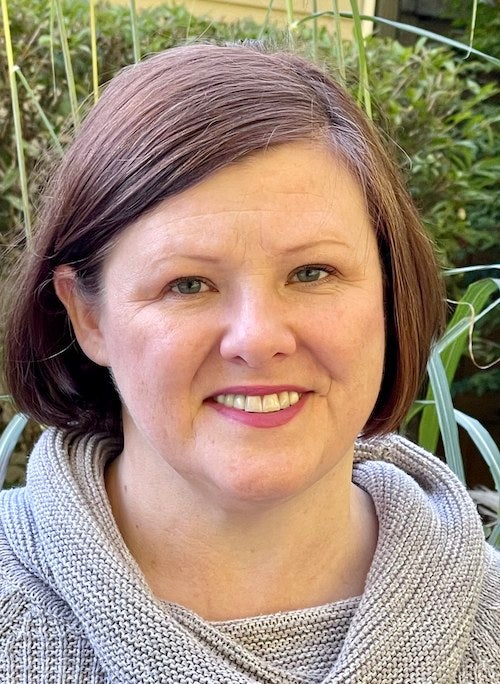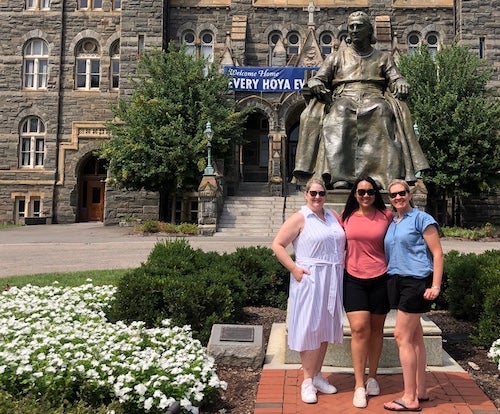Adult Gerontology Acute Care Nurse Practitioner Program Extends Values-Based Education Across United States
October 20, 2021 – When Dr. Kelly Thompson-Brazill first joined Georgetown’s faculty five years ago, she attended a simulation exercise and debriefing session for students in the Adult Gerontology Acute Care Nurse Practitioner Program at the School of Nursing & Health Studies.

“I was blown away by the quality of the students,” she said, recalling thinking, “This is the place where I need to be.”
Thompson-Brazill now leads the program, one that educates advanced practice nurses at the master’s and doctoral levels who wish to provide care for adults and older adults experiencing emergent and longer-lasting health challenges. (Visit the program’s website.)
Growth in Interest
During a recent interview, Thompson-Brazill noted that the program had grown to about 155 students, up by about five dozen students in recent years.
An anecdotal factor in nurses returning to graduate school, she noted, has been COVID-19. “People are getting burned out,” she said. “COVID has taken such a big toll on nurses who work in intensive care units.”
Further, she explained, a post-graduate certificate option is attracting a significant volume of nurse practitioners from other areas who wish to develop acute care experience.
To create a supportive environment for the student body, Thompson-Brazill and her program faculty host regular virtual town hall meetings, as well as meetings with student representatives from the enrolled cohorts. Additionally, she regularly emails them with interesting information, such as journal articles that are relevant to their studies.
“One of the things I tried to do is really build connections with the students,” she said. “We get to meet monthly with a student from each cohort. That’s worked really well as far as helping students navigate issues or concerns. I have a pretty open form of communication. I’d rather know what’s going on.”
Values-Based Education
Thompson-Brazill earned her baccalaureate in nursing at the University of Scranton, a Jesuit institution, and has worked to bring those values to the Georgetown experience.
“Everybody has to take a health care ethics course,” she said. “When we’re in class, we have unfolding case scenarios that we go through every week. We try to put in ethical issues they will come across in practice. That’s a hallmark of a Georgetown education.”
The cases might involve, for example, health disparities, health literacy, and signs of abuse. “At the end of the day, we have to manage these complex health situations, while understanding the psycho-social issues as well,” said Thompson-Brazill, whose own doctoral research was on medication adherence among adult patients with heart failure.

Recent graduate Shon Hernandez (G’21) shared that Georgetown’s values and “excellent scientific education” have prepared her well for her new role in surgical oncology.
“This patient population needs a provider who can meet their physical needs, but who also considers spiritual, emotional, and social needs of the patient and their family,” she said. “The value of cura personalis, or looking at the whole person, that has been instilled in me during my time at Georgetown will provide me with a strong foundation and allow me to make a difference in the lives of my patients and their loved ones.”
Sharing the Mission
For Thompson-Brazill, another aspect of the program’s mission is bringing a high quality, acute-focused curriculum to areas of the United States that, first, do not have this kind of option and, second, need practitioners.
“The students come from different areas, ranging from high-tech hospitals to rural facilities,” she said. “We’re able to share best practices across venues. We are really excited to be able to offer an acute care degree in places where students would not be able to get this type of education. That’s one of the main drivers of the program. It is really nice when you are able to get great care out to people who need it.”
Current student Billy Smalstig (G’22) said that he appreciates this aspect of the program.
“The struggle of rural life is of limited resources and isolation, and specialty education isn’t always accessible by traditional means,” Smalstig said. “Personally, Georgetown’s AG-ACNP Program as an online platform, without needing a traditional schooling atmosphere, is critical for my professional education. Through it, I am able to pursue my education in a way that overcomes the barriers of isolation and access.”
‘Unprecedented Time in History’
Ana Isabel Arevalo (G’21), who graduated this past summer as a member of cohort 33, reflected on the quality of the program as she studied during the uncertainties of the COVID-19 pandemic.
“I was led by an impressive group of nursing professors during an unprecedented time in history through a program that created an atmosphere of unwavering support and integrity to ensure that I would challenge myself to perform to my full potential,” she said. “This diverse program integrated social justice and provided reflection to pursue deeper knowledge for cura personalis of patients, my community, and fellow practitioners alike.”
By Bill Cessato
